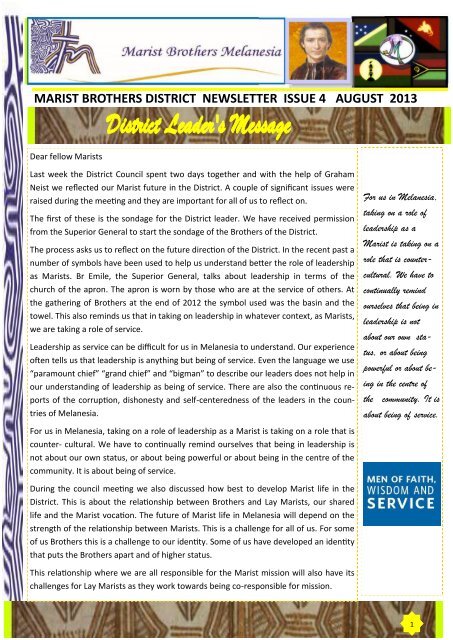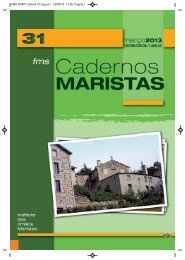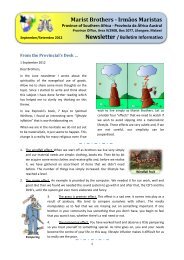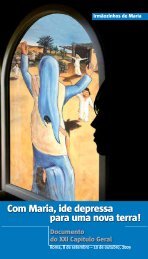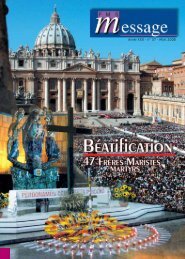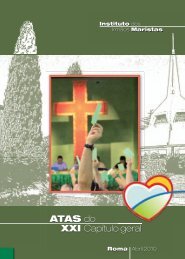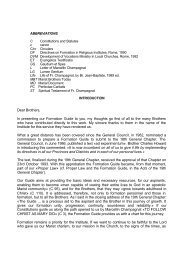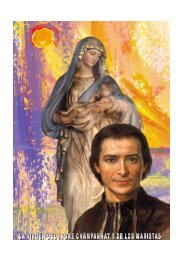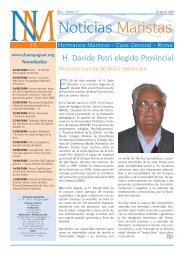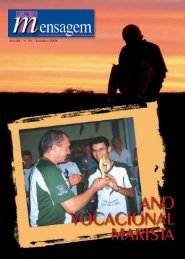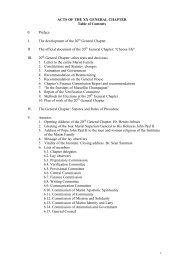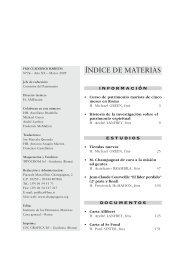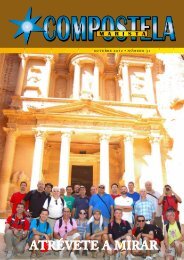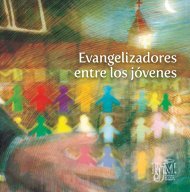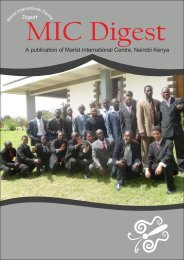marist brothers district newsletter issue 4 august 2013
marist brothers district newsletter issue 4 august 2013
marist brothers district newsletter issue 4 august 2013
Create successful ePaper yourself
Turn your PDF publications into a flip-book with our unique Google optimized e-Paper software.
MARIST BROTHERS DISTRICT NEWSLETTER ISSUE 4 AUGUST <strong>2013</strong>Dear fellow MaristsLast week the District Council spent two days together and with the help of GrahamNeist we reflected our Marist future in the District. A couple of significant <strong>issue</strong>s wereraised during the meeting and they are important for all of us to reflect on.The first of these is the sondage for the District leader. We have received permissionfrom the Superior General to start the sondage of the Brothers of the District.The process asks us to reflect on the future direction of the District. In the recent past anumber of symbols have been used to help us understand better the role of leadershipas Marists. Br Emile, the Superior General, talks about leadership in terms of thechurch of the apron. The apron is worn by those who are at the service of others. Atthe gathering of Brothers at the end of 2012 the symbol used was the basin and thetowel. This also reminds us that in taking on leadership in whatever context, as Marists,we are taking a role of service.Leadership as service can be difficult for us in Melanesia to understand. Our experienceoften tells us that leadership is anything but being of service. Even the language we use“paramount chief” “grand chief” and “bigman” to describe our leaders does not help inour understanding of leadership as being of service. There are also the continuous reportsof the corruption, dishonesty and self-centeredness of the leaders in the countriesof Melanesia.For us in Melanesia,taking on a role ofleadership as aMarist is taking on arole that is countercultural.We have tocontinually remindourselves that being inleadership is notabout our own status,or about beingpowerful or about beingin the centre ofthe community. It isabout being of service.For us in Melanesia, taking on a role of leadership as a Marist is taking on a role that iscounter- cultural. We have to continually remind ourselves that being in leadership isnot about our own status, or about being powerful or about being in the centre of thecommunity. It is about being of service.During the council meeting we also discussed how best to develop Marist life in theDistrict. This is about the relationship between Brothers and Lay Marists, our sharedlife and the Marist vocation. The future of Marist life in Melanesia will depend on thestrength of the relationship between Marists. This is a challenge for all of us. For someof us Brothers this is a challenge to our identity. Some of us have developed an identitythat puts the Brothers apart and of higher status.This relationship where we are all responsible for the Marist mission will also have itschallenges for Lay Marists as they work towards being co-responsible for mission.1
To help with the development of our Marist life the District Council has decided to establish a Marist Lifeteam. This is building on the work of Wendy Tame and the Mission Commission. Br Mark Kenatsi will bethe team leader and the team will be to be responsible for the life of our mission. It will develop and supportthe community life of the District. This has a variety of forms. There is the community of Brothersinvolved in each ministry. There is the community of Marists sharing life and mission in each ministry.There are those who take inspiration for the charism of Champagnat and are not directly involved in ourministries. The Marist life team will work with all these groups.The team will also take on the promotion of the Marist vocation in all its forms. This reflects that all of usare responsible to ensure the future vitality of the Marist charism in this part of the world. This will includeproviding a variety of different formative experiences at the local level.We see the development of this team which will have both Brothers and Lay Marists as responding to thecall of the spirit for a communion of all involved.The District Council also recognised the desire of our ministry leaders to be supported. In talking withministry leaders in recent times there is a concern that they are working in isolation from others involvedin the Marist Project. They desire connection to other Marist ministries. They desire professional development.They desire formation for their staff. They desire to be an evangelising presence among young people.In order to help to support our ministries the District Council decided to create the position of ExecutiveOfficer for Ministries. This is a further development of the work that Tony Burrows did as part of themission commission. The Executive Officer will also have responsibilities to work with Boards of Governorsand with Catholic Education Offices in promoting our Marist ministries.The District Council believes it is the right time to make these decisions. They reflect the Council’s strongbelief in the future of the Marist life in Melanesia. We have had to learn through our recent experiencethat our Marist future is not what we envisioned. It is more vulnerable and more fragile than we hadhoped. Yet we continue to be open to the call of God’s spirit in the belief that all of us share as cocreatorsin God’s Kingdom.God BlessDistrict Leader2
Br. Jean Marie writes on “International Commission for the Secretariat for Brothers Today”During the 4 th -10 th July <strong>2013</strong>, I attended the first meeting of the new commission at the General House in Rome. The“International Commission for the Secretariat Brothers Today” is composed of ten (10) Brothers, coming from thedifferent Regions of the Institute, with the idea of being able to think and reflect on a global vision of the Institute. TheBrothers are: Hipolito Perez - America Central; James Pinheiro Dos Santos - Brasil Centro Norte (Brasil); DanielO’riordan – United States of America; Juan Carlos Fuertes – Mediterranea (Spain); Albert Nzabonaliba – Central EastAfricca (Rwanda); Norbert Mwila – Southern Africa (Zambia); Saul Placious – South Asia (India); Peter Rodney – Mapac(Philippines) (Australia); Jean Marie Batick – Melanesia (Vanuatu); Tony Leon – Australia.Brother Cesar Augusto Rojas C. – Rome (Colombia) is the Director of the International Commission for the SecretariatBrothers Today. The three General Councillors, Brothers Ernesto Sánchez, Eugène Kabanguka and Josep Soteras werealso part of the meeting.The primary aim of the commission is to be an aid to think, reflect, and support the work carried out in the animationof the Secretariat. As we know that the three Calls of the 21 st General Chapter to each one of us and to the Instituteare:I. A renewed sense of consecration firmly rooted in the Gospel, urging us to new ways of being brother.II.III.A new relationship among Brothers and lay Marists, based on communion, searching together for a greater vitality of theMarist charism for our world.A highly significant presence among poor children and young people.The two areas that relate to this calls are “life and mission” of the Brothers. The Secretariat Brothers Today reflectand think that to really live that call, the importance of the Vocation Ministry and the different stages of Initial Formationneeded to be looked at with special attention.The objective of this first meeting was to come to know each other, share with each other, plan and clarifythe objectives and scope of the new commission, to draw up a first plan of work and begin to walk anddream together. And this went very well within a week of being together as <strong>brothers</strong>. There was a real signof being brother to one another, a strong sense of family spirit and belongingness. That sense of being oneopens the way to share and communicate freely with one anotherBr. Jean Marie Batick3
My Experience at Vanga Point CommunityWhen I first arrived at Vanga Point, a group of boys were there waitingfor me and greeted me with welcoming faces. At that very moment I feltvery much at home. They then helped me to bring my luggage to theBrothers’ house.At the Brothers house there were also Lay Marists and Brothers whowere there for their gathering. It was interesting to hear that the Maristsfrom St Josephs’ Mabiri came to visit the Marists from Vanga Point. I wasvery excited about that because I could feel that there was a sense of Maristfamily spirit with the two groups which I felt very much a part of.My time at Vanga Point was an enriching opportunity and privilege toexperience the life of the Brothers in an apostolic community. The Brotherslive their lives in community and work in co-operation with otherteachers. I was touched by the relationship that the Brothers have withthe ex-<strong>brothers</strong> and how they work together at St Marcellin PrimarySchool. I was able to help out in the Brothers Project (Echo Tourism House). Seeing how committed the Brothers are inloving and doing their work, I am challenged to reflect on my own life.The Brothers were very good to me. They introduced me to their family friends. We worked in the garden, at the RuralTraining Centre (RTC) farm. Apart from working in the garden, I was able to go fishing at night.Vanga Point ,for me is a good place to be. From my community experiences, I had learnt a lot and felt very much part ofthe Marist Family there. More on that, the experiences really built up my desire of becoming a Marist Brother.The Brothers were very supportive, caring and patient with me. This had really allowed me to enjoy my time with them inthe community.I would like to thank each one of them for their brotherly support and love to me. Thank you Brothers Elie, Brendan andValentin and also a big thank you to our Marist students and friends.OMI EmmanuelSecond Year PostulantIf you are interested to knowmore about us contact theVocation Director atMarist Brothers LaumanasaP.O.Box 82HoniaraSolomon IslandsFirst Year Postulant on voyage to Vanga PointStanding: De Lasalle, Fereel, Epalle.Sitting: McDonald4
The Oceania Council Leadership Program was held inLomeri, Fiji in July. Leaders in various Marist ministriesin the Pacific and Melanesia attended the Program.Mrs Ruth, Mrs Jane, Mr. Abraham and Br. Dominicfrom St. Joseph’s Tenaru in Solomon Islands and MrsSharon and Mr. Charles from St. Joseph’s Mabiri inBougainville, Papua New Guinea represented theDistrict of Melanesia. Br. Brendan and Br. Eli fromVanga Point were not able to join the group due to visa<strong>issue</strong>s.Report by Mr Charles Jorai on page 7Br. Graham with participant in Oceania Council LeadershipSt. Joseph’s Mabiri - Vanga Point Experience <strong>2013</strong>Staff of St. Joseph’s Mabiri in Bougainville , St. Dominic R.TC and St. Marcellin Primary School in VangaPoint, Gizo Solomon Islands. It was a time for the Brothers and Laity to reflect on their Marist ministriesand to support one another in their vocation to keep alive St. Marcellin’s Dream in the District ofMelanesia, especially in the education of the young.Teachers and support staff of St. Joseph’s Mabiri (Bougainville) St. Dominics RTC and St. Marcellin Primary School (Solomon Islands)Mr Chris Lus from Korobosea office left for the University of Sydney in Australia.He will take Masters in Human Rights and Democratisation. The course startedon July 29 <strong>2013</strong> and continues till June 2014. His study is funded by theEuropean Union.Mr Chris LusHe quoted Franklin D. Roosevelt, “Freedom means the supremacy of Humanrights everywhere. Our Support goes to those who struggle to gain those rightsand keep them.”5
A big thank you and appreciation to the Brothers in the different ministries of the District. For the many good works of witnesses offaith and in the mission of the Marist Brothers, we are grateful for the gift of life of our <strong>brothers</strong> in the community and also to ourMarist companions.Br. Brendan Neily and Br.Michael McManus will return to Australia at the end of this year. These are two great men who havetouched the lives of many young people.Brother Brendan Neily joined the staff at DWI (Divine Word Institute), now Divine Word University, as counsellorand lecturer in 1994, was elected District Leader in 1999 and moved to 16 mile outside Port Moresby.He re-joined the community at Madang on 11 November 2002 when District Administration moved toMadang. Madang community continues to play its part in creating the dream of a Melanesian Marist Brotherhoodand mission.BRENDAN NEILYBr. Brendan is and will be remembered by many young men who were once postulants, novices or Brothersand students, and those who knew him.Br Michael McManus FMS, a senior lecturer in the Department of Communication Arts Department atDivine Word University - Madang. He came to Divine Word University in 1998, and he lectures in CommunicationSkills, Media and Society, Media Law and Ethics as well as Family and Social Issues. He has researchinterests in domestic and sexual violence, child rights and journalism curriculum. He has significant impacton journalism in P.N.G. He is a brother to all who pass through Madang communityMICHAEL McMANUSThese two great men have had a significantly positive impact in the life of the Marist Brothers of the District of Melanesia, to thosethey work with and their students. They will be missed by many. Go well Brothers!!Bertrand Webster is appointed to be community leader at Madang in 2014. Valentin Samsam and Renaud Tsione will be with BrBertrand in Madang. The two will enrol for study at D.W.U. Madang Community has been a community of lecturers over the yearsbut will become a community of students with Bertrand as their director.Blaise Jai will do his practice teaching at St. Joseph’s Mabiri, Bougainville and is appointed to the community at Santo for 2014Charles Tavore is appointed to the community at Vanga Point in Solomon Islands.Ken Lasin will travel to Rome for formation programFrank Hough will move to Port Moresby community. He will be the director of the Right Relationships at the Catholic Bishop Conference.Dominic Tsibuen will move to Mabiri where he will be the community leaderOther appointments will be made known soon after Br. Ken’s consultation with the Brothers.LET US ALWAYS REMEMBER TO PRAY FOR ONE ANOTHER6
St. Joseph’s College – MabiriP.O. Box 184, BukaAutonomous Region of Bougainville<strong>2013</strong> Marist Oceania Leadership Course (Saturday 29 th June to Friday 05 th July)Report to the DistrictIntroductionEvery second term break, secondary and high schools teachers in Bougainville and across PNG normallyspend the first of the two weeks break undergoing active in-service programs. It can be provincial,in cluster groups or as school-based in-services. During the last in-service training weekteachers at St. Joseph’s College (Mabiri) had an amazingly new experience.While the rest of the teachers and a couple of support staff courageously crossed the rough SolomonSea to Marist schools at Vanga Point - Gizo, in the neighbouring Solomon Islands for in-service sessions,Mrs Sharon Hannets and I had the opportunity to attend the ‘Oceania Leadership Course’ heldat Lomeri, Fiji from Saturday 29 th June to Friday 05 th July, <strong>2013</strong>.Experiences and SharingsSponsored and organised by the Oceania Council, the course was coordinated by Br. Terry Costelloand facilitated by Br. Graham Neist. A total of fifteen participants from Melanesia and Pacific participated.Participants were mainly middle managers in the schools that were either founded by MaristBrothers or Brothers were invited to staff.The course was conducted with reflections, discussions and activities on the leadership of a schoolfounded and based on the vision and charism of St. Marcellin Champagnat, Founder of the MaristBrothers. All sessions were very enriching. The most interesting as well as challenging in most sensewas the session on defining ‘Catholic and Marist schools’. I felt this was the very significant part ofthe course because what is distinct to Marist schools makes them different to ordinary Catholicschools. It is this distinctiveness that should form the integral part of all our programs. This distinctnessgives a Marist school its ‘Marist Flavour’. I believe those are qualities that Father Champagnatwants alive in our schools. Personally, l felt challenged by this and so inviting us all into nourishingand developing these qualities in our schools.The facilitation was awesome. Our facilitators were very amazing men of wisdom and knowledge.Br. Graham was very inspiring as he presented with great insight. His examples perfectly suited theculture difference that was in the group. “What a Gift God blessed the Institute with in such persons”.The prayer reflections were very touching and really complement our sessions.On behalf of Sharon and myself and our colleague from Tenaru, I would like to acknowledge effortsof those that made this conference possible for us. The Oceania Council for its funding, DistrictCouncil for our nomination, the Brothers and the Novices at Lomeri for the hospitality and friendship,Br. Terry Costello for the great organisation, and Br. Graham for the inspirational presentations.The Oceania council has taken a positive and timely step forward and the onus is on participantsto extend experiences to others in our respective schools.Mr Charles Jorai7
“Becoming Champagnat Portraits Today”Dear Fellow Marists,As Marists we are all invited to become ‘living Champagnat portraits of today by becoming martyrs of love”.In this short reflection, I wish to share with fellow Marists some of the ideas shared during a conference ofAustralian Marist Schools I attended recently alongside with Br. Cornelius of St. Joseph’s College – Mabiri from 28 th -31 stJuly <strong>2013</strong>. I wish to thank our District Leader for giving both of us the opportunity to participate in this conference.As Marist leaders, we were challenged to become ‘living Champagnat portraits’ of today. It was indeed an invitation to modelour life and work on Mary as lived out by St Marcellin Champagnat. In our effort in becoming living portraits of Champagnat,we are invited to take Champagnat spirit and charism beyond the existing frontiers which we often feel more comfortable withand move into the unknown with confidence and love. It is indeed an invitation to all of us Marists to grow in faith and trust inGod. Truly, ‘God can do anything with nothing’. Often our fears to take bold decisions and take risks pull us down and awayfrom entering into a genuine commitment to face the unknown and the new frontiers around us.The world today as we know it is indeed a fast-forwardworld. Right across Melanesia, our young people aregradually exposed to new ideas, culture and a revolutionin technology. As Marist leaders, we must be willing totake risks and to remain in tune with this wind of change.There is a tendency for many of our students to driftaway from the faith given to them by their parents. AsMarist educators, we are obligated to guide and deviseprograms in our schools that can encourage our studentsto contemplate and listen attentively to the voice of Godin their lives. Such programs can be organized in smallgroups with the support and guidance from class patronsand home room teachers. It can be done in the classroombefore each lesson and should not take more than 5 minutes.St. Joseph’s Tenaru Students with Mr Abraham, the PrincipalAs Catholic schools and as Marist educators, we are invited to turn our schools into primary agents of Catholic faith development.We can do this if we remain committed to promoting programs that support and enhance spirituality development andformation. The energy to do this will depend also from how well we can allow our self to interact freely in creating a communityof service and love.Many of us often claim that because we are not trained in Religious Studies therefore, we cannot teach RE. I think St. Augustinehas a very important teaching for us. He said, ‘I was looking for you but you were in me”. We are created images of God.We can also literally say that we are God. We are therefore, invited to experience God and share our experience of God withour young people. Teaching about God is not about telling our students what we know about God but rather it is about sharingour experience of God. All of us are on a mission to live the Gospel values to our students.Like Mary who sets out in haste, we are invited to live our lives in service and bring Jesus to our students. Are we preparedto go beyond the recognized boundaries and care for the most vulnerable people in our community? We are challenged to upholda strong and significant presence among young people, especially those with academic imparities and behavior needs. Wemust learn about who they are. It is our responsibility to look for them and guide them. This calls for a change to our existingmindset about these students and offer our generous assistance in the true spirit of love and compassion.As echoed by Br. Jeff Crowe, the invitation to become Champagnat figures today requires sacrifices, risk taking, putting otherswell-being first, others first policy, putting yourself in the student shoes and knowing each student by name. This is the callwe are all invited to actively participate in making a difference in a child’s life today.Mr Abraham HihiruPrincipalSt. Joseph’s Tenaru Catholic Secondary School Solomon Islands.8


